- Give
- Alumni
- Parents
John Brown University
2000 W. University St., Siloam Springs, AR 72761479-524-9500
jbuinfo@jbu.edu
Major in Electrical Engineering
Become an electrical engineer • Solve critical problems • Make a difference
Solve advanced problems.
In the electrical engineering major, you'll learn to apply science and technology to the service of God and humanity. With an emphasis on design, you'll graduate prepared for a career in engineering or advanced degrees.
Start your applicationGet hands-on experience
You'll gain hands-on experience from courses such as electronics and embedded systems and coding skills in classes such as digital systems.
Enjoy fantastic facilities & equipment
The Balzer Technology Center houses over 40,000 square feet for classroom, lab and fabrication areas. Students have access to a laser cutter, a new mill, a carbon fiber 3d printer and more.
Get technical skills
At JBU, you will earn a strong background in robotics, machine design, 3D computer-aided drafting and computational modeling.
Not sure which degree to choose?
JBU engineering students have three semesters to decide which degree to pursue - the B.S.E.E. (Bachelor of Science in Electrical Engineering) or the B.S.M.E. (Bachelor of Science in Mechanical Engineering).
Learn more about the mechanical engineering major.
The most valuable lesson I learned was how to take the next step, no matter how small. Electrical engineering projects are complex and often looking at the whole picture had a paralyzing effect on me. My professors helped by allowing me to feel overwhelmed and turn to them when I needed help. This is definitely something I will rely on to move forward even when I am anxious.
Karis Trippe '22
Electrical Engineering
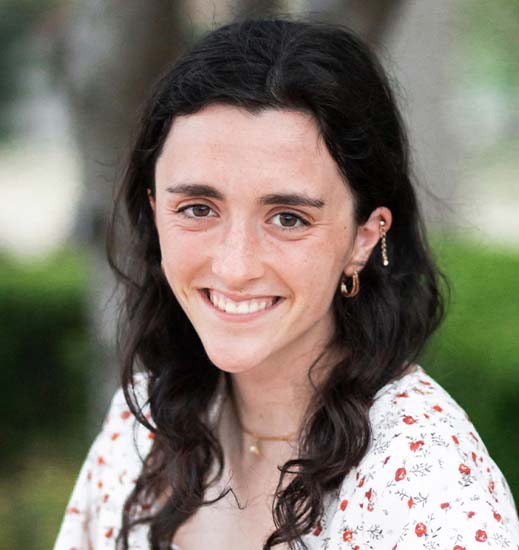
What to expect as an electrical engineering student
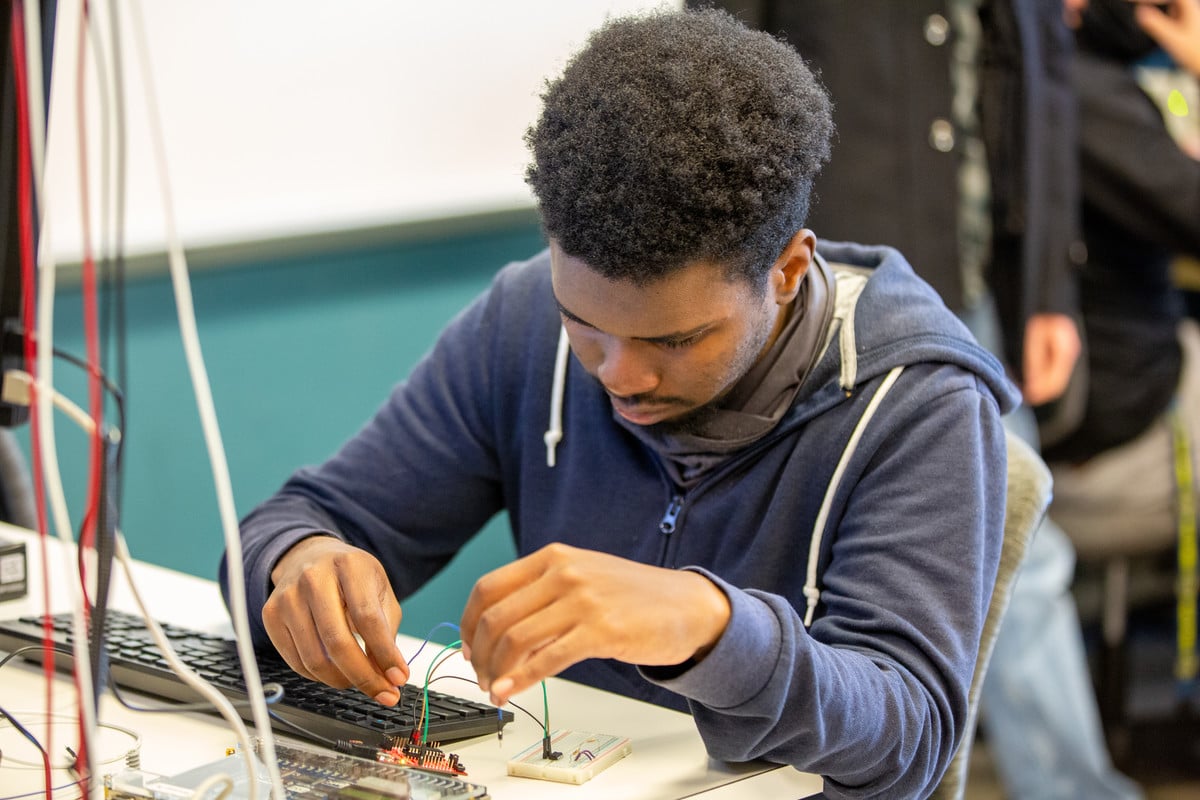
Understand design
Engineering students begin learning design in their first year and culminate in a senior capstone project with a real-world situation.
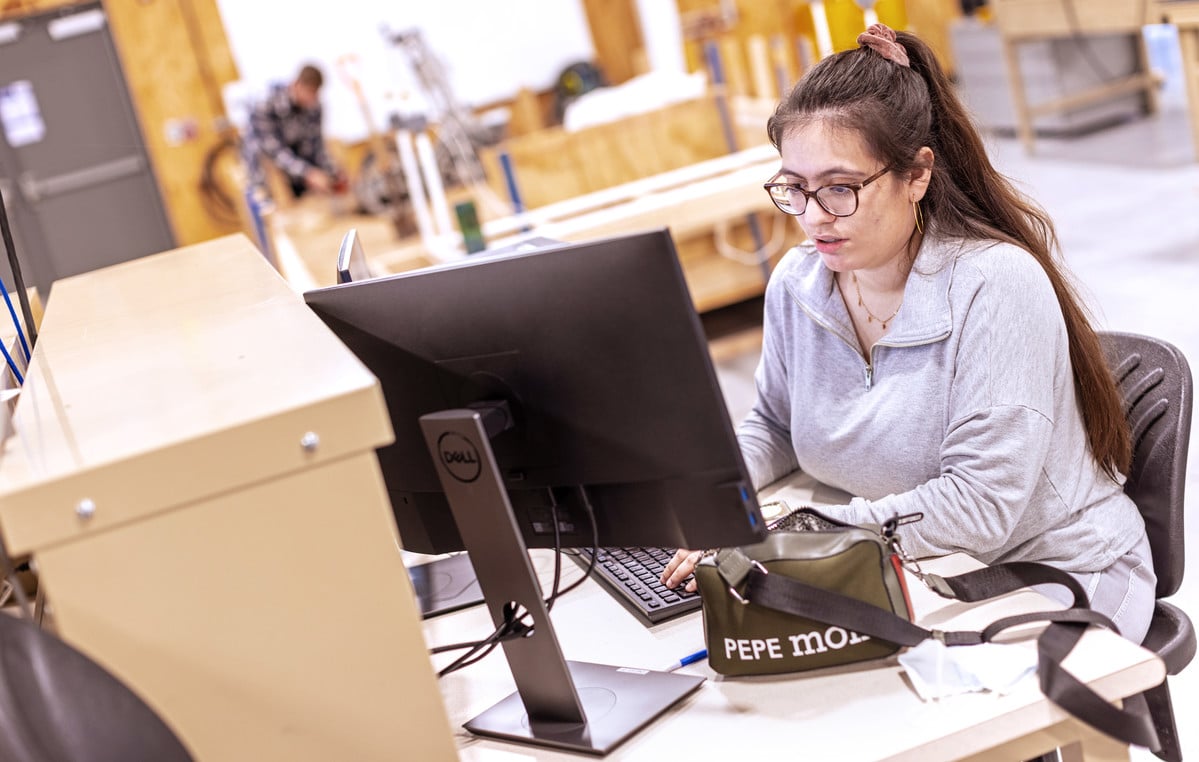
Apply for prestigious internships
Our students regularly take summer internships at top companies like NASA, Texas Instruments, and Lockheed Martin. Our faculty help connect and guide you to great opportunities.
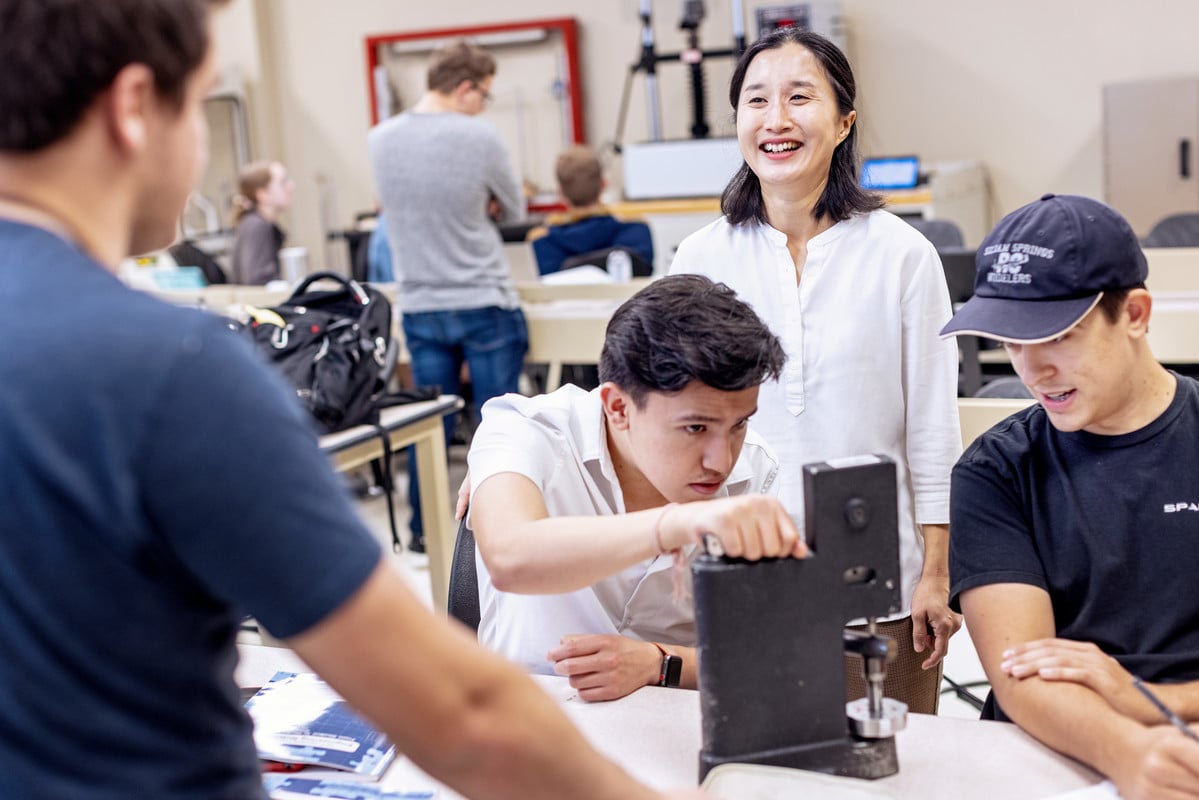
Expand your degree
You'll be able to expand your electrical engineering degree with one of our many minors, such as civil engineering, game design or renewable energy.
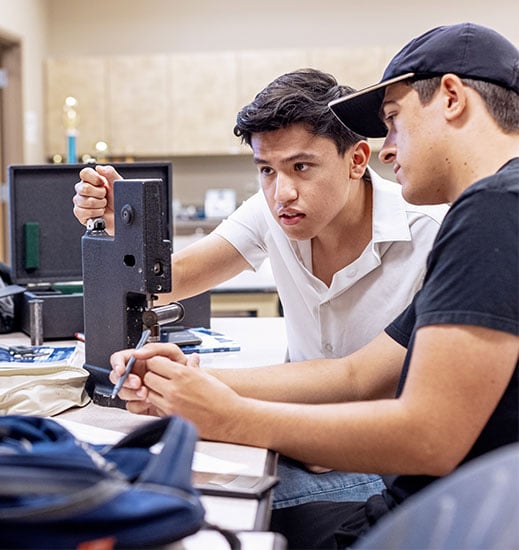
Explore our minors
JBU offers a variety of minors related to the engineering, computer science and cybersecurity fields.
Meet our electrical engineering professors
Dr. Shanon Vuglar joined the JBU engineering faculty in 2018. He received his B.Tech. (Aeronautical Engineering), B.E. (Electrical Engineering), and M.Sc. (Information Technology) from the University of New South Wales, Canberra, Australia, while serving in the Royal Australian Air Force. On completing his undergraduate degrees, he served as an Engineering Officer, predominantly working in the areas of Information Operations and Communications. In June 2015, he was awarded a Ph.D. (Electrical Engineering) from the University of New South Wales. His doctoral research was in the area of quantum control and considered the physical realizability of quantum systems. Before joining JBU, he held postdoctoral research positions at the University of Melbourne and Princeton University. He has published four journal articles and five peer-reviewed conference papers. Dr. Vuglar values being an active part of a vibrant Christian community and has led prayer and Bible study groups as well as serving on worship teams, playing saxophone and drums. He enjoys running, cycling, mountain biking, and skiing and in July 2018, he successfully completed his first Ironman Triathlon (Lake Placid, NY). He also enjoys playing chess and other board games.

Shanon Vuglar
Assistant Professor of Electrical Engineering
Dr. Ted Song has been serving as Chief Intercultural Engagement Officer in the President’s Cabinet since 2021. He joined JBU in 2012 as a professor of electrical engineering and has served as Coordinator of Diversity, Chair of the Faculty Affairs Committee, Director of Innovation, and Chair of the Engineering, Computer Science, and Cybersecurity Departments. In addition to his Chief Intercultural Engagement Officer role, he started serving as Chief Innovation Officer in 2023.
Ted grew up both in the U.S. and Korea and is a CQ® (Cultural Intelligence) certified facilitator. He was an ROTC cadet during his undergraduate studies and served as an Air Defense Artillery Officer in the Republic of Korea Army. He received his Doctor of Philosophy (Ph.D.) in electrical and computer engineering from the University of Texas at Austin and his Master of Divinity (M.Div.) from Southwestern Baptist Theological Seminary. He is currently pursuing a law degree (M.S.L.) at Samford University, focusing on Higher Education Law and Compliance.
Outside JBU, Ted serves as Vice President of the Christian Engineering Society and Chair of the Council for Christian Colleges & Universities (CCCU) Diversity and Inclusion Commission. In addition, he serves as a Peer Reviewer for the Higher Learning Commission (HLC) and on the Boards of Water for Good/Lifewater and Western Benton County Partnership. As a passionate teacher and leader in Christian higher education, he is a proud recipient of the 2012 Texas Exes Teaching Award, the 2018 JBU Faculty Excellence Award, and the 2022 Leading with Excellence Award from Black Action Collective. In 2023, Ted was selected as an inaugural CCCU Presidential Fellow.
Ted and his wife, Michelle, live in Siloam Springs, Arkansas, and have three daughters. They are members at Siloam Springs Bible Church (an Evangelical Free Church), where Ted leads the College Ministry and serves as an elder.

Ted Song
Associate Professor of Electrical Engineering; Chief Intercultural Engagement Officer, Chief Innovation Officer
Dr. Justus Selwyn holds a Doctorate degree in Computer Science, specializing in Software & Knowledge Engineering. Having served the academia, industry, and research in Indian Universities (2001-2021), Justus is now with JBU teaching computer science. His research works have been published in several journals, and he has traveled to Germany, Israel, and the USA to present his works at international conferences. He has published his research works in 54 Journal publications, 20+ conference papers, and has co-authored 2 books. As a part-time software consultant, he has provided software products/solutions to software companies like Ericson India, PhantomFX, Einel Technologies, to his previous employers, and to several small/medium businesses, and Christian organizations. With his God-given talents, Justus glorifies the Lord by leading & singing in a male vocal quartet, Chordiels, serving a local church's worship band, teaching music and, encouraging students who willfully want to serve the Lord. He has recorded and produced more than 460+ gospel songs and still counting. He is also documenting the Christian Hymns in his native language Tamil, and continues to publish at least one hymn every week on Sunday mornings. Justus is married to Hepsiba, also a professor at JBU. They have a son, Handel. They all love to serve the Lord through their music ministry in the church and in their community.
External Links
https://techguide.org/computer-science/masters-in-computer-science/#expert=justus-selwyn

Justus Selwyn
Department Chair of Computer Science; Professor of Computer Science
Mr. Juan Carlos Rodriguez joined the faculty of JBU in 2016. He received his B.S.M.E from John Brown University in 2006 and earned his M.S.M.E. from the University of Tulsa in 2008. His Master’s research was studying the effects of viscosity and particle size in erosion for multiphase flow. He returned to his home country of El Salvador and worked for Unilever at one of their regional manufacturing facilities. He worked five years as a Project Engineer and one year as a Manufacturing Manager. These experiences allowed him to develop a special interest for technical and management aspects of the manufacturing industry. He returned to JBU in 2014 and received his second Master’s Degree in Higher Education and Leadership in 2016. During this time he also served as the Resident Director for one of the on-campus residence halls.
Mr. Rodriguez and his wife, Lulu, have one beautiful baby daughter, Emma. They have a heart for serving young people in the Lord and have co-lead youth groups, community groups, and provided mentoring to many high school and college students. They also enjoy watching movies, traveling and spending time with family.

Juan Carlos Rodriguez
Dean of Residence Life; Assistant Professor of Mechanical Engineering
Dr. John Lee joined the Engineering Faculty at John Brown University in the fall of 2018. Dr. Lee received his Bachelor of Science in Mechanical Engineering at Oklahoma Christian University in the spring of 2008 and his Doctor of Philosophy in Engineering with an emphasis in Mechanical Engineering from the University of Arkansas at Fayetteville in the spring of 2018. His doctoral dissertation is in fluid phase separation via nanochannel arrays for space propulsion. During his academic career he was afforded the opportunity to participate in numerous internships, including a research experience for undergraduates at the University of Arkansas, process engineering at Eaton Corporation, and a dynamics lab at Los Alamos National Labs. While finishing his dissertation research, he worked for WattGlass, a solar panel coating start-up at the University of Arkansas Engineering Research Center.
Dr. Lee and his wife, Nicole, enjoy spending time with their wonderful daughter, Zoey, and amazing son, Zane. They enjoy traveling as a family and experiencing other cultures, cuisines, and foreign landscapes. In his free time, Dr. Lee enjoys sporting events, golf, and woodworking. He and his family are members at Cross Church, Fayetteville.

John Lee
Department Chair of Engineering; Assistant Professor of Mechanical Engineering
Dr. Michelle Kim grew up in South Korea, Malaysia, Singapore, and the United States and received her Ph.D. in Biomedical Engineering at the University of Texas at Austin.
Dr. Kim moved to Siloam Springs, Arkansas, in 2012 with her husband, Dr. Ted Song. Before joining JBU, she served as a faculty member in the Department of Biomedical Engineering at the University of Arkansas for seven years. Dr. Kim and Dr. Song have three wonderful daughters—Leanne, Erin, and Kori.

Michelle Myunghee Kim
Associate Professor of Engineering
Mrs. Kimberly Cornett has been teaching with the Engineering Department since 2015. She received her B.S.E with concentration in Electrical Engineering from John Brown University in 2007 and earned her MSEE from the University of Arkansas in 2009. Her Master’s research was integrated circuit design for extreme environment applications in Space and on surface of the Moon and Mars. Some of the circuits she worked on orbited with the International Space Station. She then worked for Texas Instruments as a Servo Systems Engineer for 3.5 years developing application-specific integrated circuits for the hard disk drive industry. These experiences developed her special interests in circuit design and verification as well as project management. Mrs. Cornett has served as the Counselor for the JBU Chapter of the Society of Women Engineers and loves to encourage young girls to pursue STEM careers.
Mrs. Cornett and her husband Nick Cornett (JBU Graduate Counseling Faculty) returned to Siloam Springs in 2012. They have one daughter and two sons. They are active in the local church and Bible study groups. She enjoys spending time with family, baking, sewing, woodworking, running, hiking, biking, and spectating various sports.

Kim Cornett
Instructor of Electrical Engineering
Dr. Tim Gilmour joined the engineering faculty in August of 2012. He teaches electrical engineering and computer science courses. He received his B.S.E.E. from Cedarville University in 2003, his M.S.E.E. from Penn State University in 2005, and his Ph.D. from Penn State University in 2012. In his master's research, he applied artificial intelligence methods to brain-computer interfaces. In his doctoral work, he applied signal processing techniques to investigate the impact of cell transplants on brain electrical activity in Parkinson’s Disease. He has published seven journal papers and presented several conference papers, and is a licensed professional engineer in the state of Arkansas. In his free time he enjoys spending time with family and friends, reading, and music. He is passionate about apologetics and spreading the good news about Jesus Christ.

Tim Gilmour
Department Chair of Cybersecurity; Associate Professor of Electrical Engineering
Dr. Chaz Miller joined the Engineering Faculty at John Brown University in the fall of 2023. He received his Bachelor of Science in Mechanical Engineering from the University of Arkansas in the spring of 2017 and his Doctor of Philosophy in Engineering from the University of Arkansas in the spring of 2023. For his graduate research, he developed PTFE-based solid lubricant coatings for bearing and gear applications on the International Space Station.
Dr. Miller and his wife, Valeria, were married in her hometown of Tarija, Bolivia in 2019. They enjoy traveling to Bolivia to visit her family every year.
In his spare time, Dr. Miller enjoys fishing, golf, and playing board games.

Chaz Miller
Assistant Professor of Mechanical Engineering
Questions?
Loading...
The future you starts here.
Equip yourself for a successful career and a life of purpose.
Resources
Policy Information
JBU does not unlawfully discriminate based on race, color, national or ethnic origin, sex, age, disability, marital status, military status, or age in the administration of its educational policies, admissions, financial aid, employment, educational programs, or activities.
John Brown University is a leading private Christian university, training students to honor God and serve others since 1919. Arkansas’ top-ranked university (The Wall Street Journal) and top-ranked regional university (U.S. News), JBU enrolls more than 2,200 students from 37 states and 42 countries in its traditional undergraduate, graduate, online and concurrent education programs. JBU offers more than 50 undergraduate majors, with top programs including nursing, psychology, construction management, graphic design, family and human services, and engineering. Eighteen graduate degrees are available in business, counseling, cybersecurity, and education.
Copyright 2024 John Brown University. All rights reserved.

